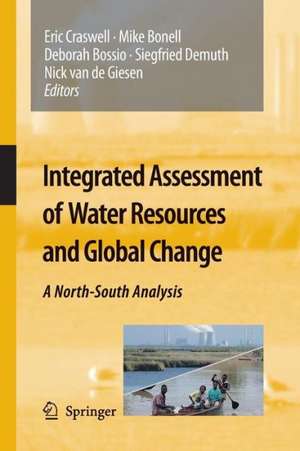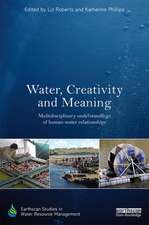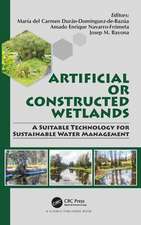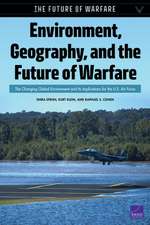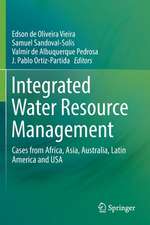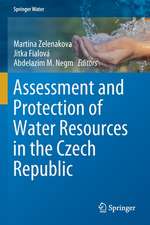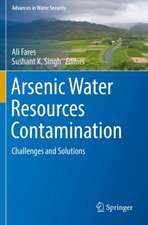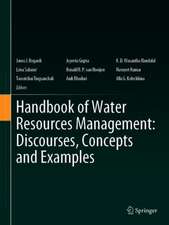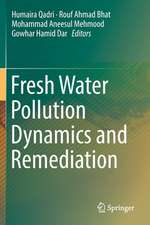Integrated Assessment of Water Resources and Global Change: A North-South Analysis
Editat de Eric Craswell, Mike Bonnell, Deborah Bossio, Siegfried Demuth, Nick van de Giesenen Limba Engleză Paperback – 17 sep 2014
The pressing water problems must clearly be tackled from an integrated perspective taking into account environmental, human and technological factors and especially their interdependence. The key papers in this volume from the Bonn conference focus on the challenges of integrated assessment of water resources in the context of global change. The growing gap between North and South is also addressed, in terms not only of access to water and its quality, but also of the capacity to do research and implement solutions.
The coverage of the papers is up-to-date and comprehensive. Highlights include emerging concepts such as blue and green water, virtual water, the water footprints of nations, multi-agent modelling, linkages between water and biodiversity, and social learning and adaptive management.
| Toate formatele și edițiile | Preț | Express |
|---|---|---|
| Paperback (1) | 644.49 lei 6-8 săpt. | |
| SPRINGER NETHERLANDS – 17 sep 2014 | 644.49 lei 6-8 săpt. | |
| Hardback (1) | 653.00 lei 6-8 săpt. | |
| SPRINGER NETHERLANDS – 26 ian 2007 | 653.00 lei 6-8 săpt. |
Preț: 644.49 lei
Preț vechi: 758.23 lei
-15% Nou
Puncte Express: 967
Preț estimativ în valută:
123.34€ • 133.93$ • 103.60£
123.34€ • 133.93$ • 103.60£
Carte tipărită la comandă
Livrare economică 23 aprilie-07 mai
Preluare comenzi: 021 569.72.76
Specificații
ISBN-13: 9789400793118
ISBN-10: 9400793111
Pagini: 380
Ilustrații: VI, 373 p.
Dimensiuni: 155 x 235 x 20 mm
Greutate: 0.53 kg
Ediția:2007
Editura: SPRINGER NETHERLANDS
Colecția Springer
Locul publicării:Dordrecht, Netherlands
ISBN-10: 9400793111
Pagini: 380
Ilustrații: VI, 373 p.
Dimensiuni: 155 x 235 x 20 mm
Greutate: 0.53 kg
Ediția:2007
Editura: SPRINGER NETHERLANDS
Colecția Springer
Locul publicării:Dordrecht, Netherlands
Public țintă
Professional/practitionerCuprins
Shift in thinking to address the 21st century hunger gap.- A grid-based assessment of global water scarcity including virtual water trading.- Water footprints of nations: Water use by people as a function of their consumption pattern.- Transitions towards adaptive management of water facing climate and global change.- Stakeholder-driven, enquiry-driven, or stakeholder-relevant, enquiry-driven science?.- Learning Alliances for the broad implementation of an integrated approach to multiple sources, multiple uses and multiple users of water.- Possibilities and problems with the use of models as a communication tool in water resource management.- Integration of the biophysical and social sciences using an indicator approach: Addressing water problems at different scales.- Capturing the complexity of water uses and water users within a multi-agent framework.- Upscaling field scale hydrology and water quality modelling to catchment scale.- Linking databases of different sources and scales for groundwater research in the Urema River Basin/Central Mozambique.- Integrated water and food analysis at the global and basin level. An application of WATERSIM.- The adaptive integrated data information system (AIDIS) for global water research.- Policy implications of a pan-tropic assessment of the simultaneous hydrological and biodiversity impacts of deforestation.- Towards better water security in North China.- Towards transition management of European water resources.- Some foci of integrated water resources management in the “South” which are oft-forgotten by the “North”: A perspective from southern Africa.- The GLOWA Volta Project: A framework for water resources decision-making and scientific capacity building in a transnational West African basin.- Integrating a climatechange assessment tool into stakeholder-driven water management decision-making processes in California.- Involving stakeholders in integrated river basin planning in England and Wales.- Integrated assessment of water resources: Australian experiences.
Textul de pe ultima copertă
How can the Earth’s finite water resources be managed sustainably to meet the growing needs of humans and of nature in ways that avert the looming crisis? The need to find answers to this question has exercised the minds of many scientists, practitioners and policymakers who recognise the urgency of the problems. These concerns have spawned a number of international research initiatives and programs, prominent representatives of which met to review progress and exchange views at an international conference in Bonn, Germany in February 2005.
The pressing water problems must clearly be tackled from an integrated perspective taking into account environmental, human and technological factors and especially their interdependence. The key papers in this volume from the Bonn conference focus on the challenges of integrated assessment of water resources in the context of global change. The growing gap between North and South is also addressed, in terms not only of access to water and its quality, but also of the capacity to do research and implement solutions.
The coverage of the papers is up-to-date and comprehensive. Highlights include emerging concepts such as blue and green water, virtual water, the water footprints of nations, multi-agent modelling, linkages between water and biodiversity, and social learning and adaptive management.
Audience: Policy-makers, practitioners and researchers concerned with integrated water resources management; scientists from physical, biological, ecological, and social sciences involved in research on global environmental change and natural resources; scientists concerned with water resources in developing countries.
The pressing water problems must clearly be tackled from an integrated perspective taking into account environmental, human and technological factors and especially their interdependence. The key papers in this volume from the Bonn conference focus on the challenges of integrated assessment of water resources in the context of global change. The growing gap between North and South is also addressed, in terms not only of access to water and its quality, but also of the capacity to do research and implement solutions.
The coverage of the papers is up-to-date and comprehensive. Highlights include emerging concepts such as blue and green water, virtual water, the water footprints of nations, multi-agent modelling, linkages between water and biodiversity, and social learning and adaptive management.
Audience: Policy-makers, practitioners and researchers concerned with integrated water resources management; scientists from physical, biological, ecological, and social sciences involved in research on global environmental change and natural resources; scientists concerned with water resources in developing countries.
Caracteristici
State of the art review of the science of integrated water resources management in industrialised and developing countries Novel concepts such as blue and green water, virtual water trade, water footprints of nations, etc. New perspectives and methodologies for modelling, up-scaling, and social learning in water management
